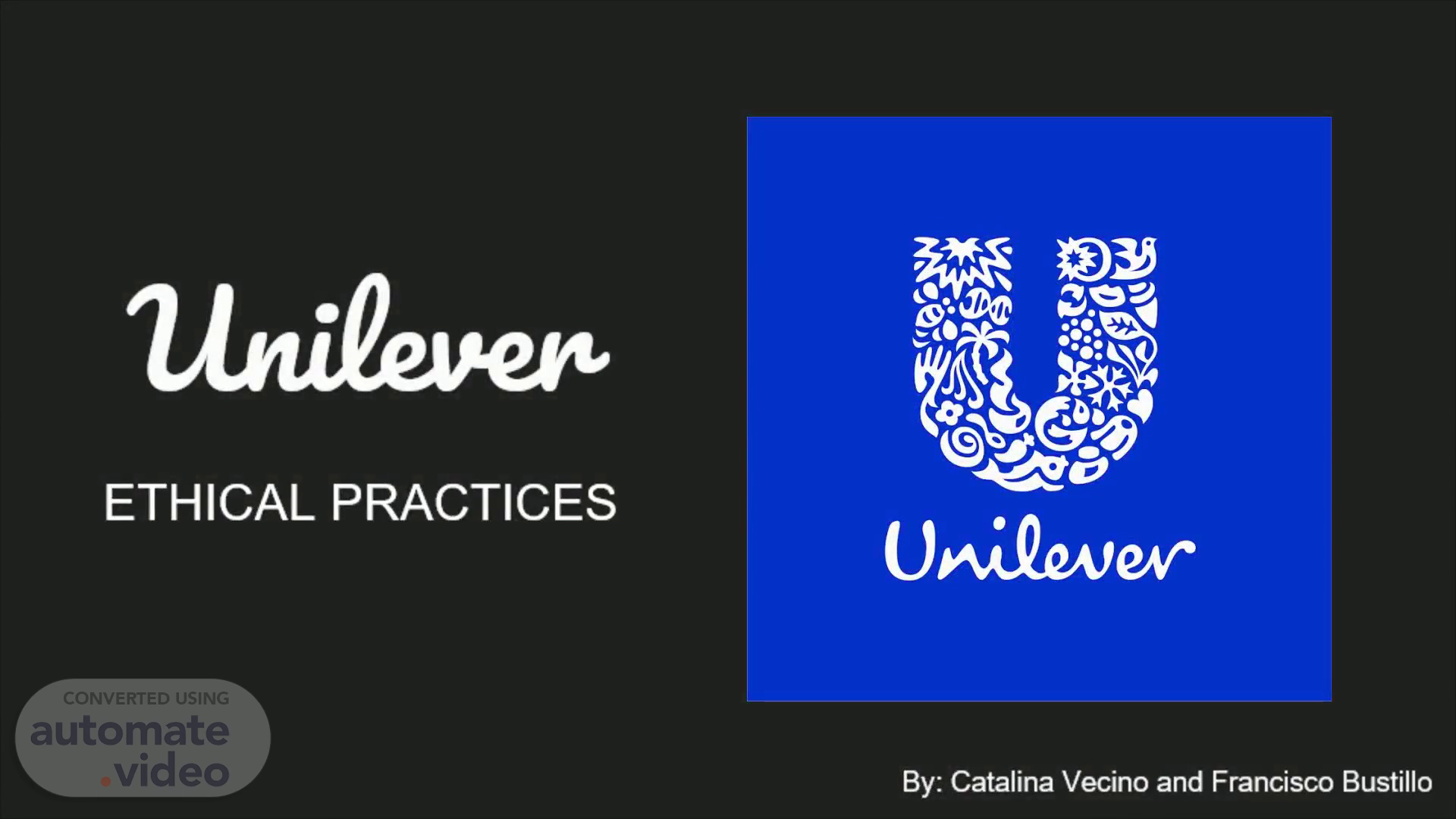Scene 1 (0s)
Unilever. ETHICAL PRACTICES. By: Catalina Vecino and Francisco Bustillo.
Scene 2 (8s)
Our research highlights several ethical issues with Unilever, including environmental reporting, habitats & resources, palm oil, pollution and toxics, human rights, workers' rights, supply chain management, irresponsible marketing, animal rights, animal testing, factory farming, anti-social finance, controversial technologies and political activities..
Scene 3 (29s)
Environment. Unilever stated "in 2017, we achieved 78% traceability and made progress on mapping our suppliers, third-party suppliers and mills in our extended supply chain." The company’s ACOP listed several more positive initiatives it was undertaking in its supply chain, including certifying more than 60 factories, validation of the mill points, site verification for independent mills, and a program to help independent smallholders to achieve RSPO certification and to increase the traceability and certification of smallholders..
Scene 4 (51s)
Animal Rights. "As part of our commitment to ending animal testing, we have a growing number of brands that ensure that neither their products – nor the ingredients they use – are subject to animal testing by suppliers or by regulatory authorities. These brands’ commitment to no animal testing is certified by animal welfare groups." However, the statement did also read: "Occasionally, across our portfolio, some of the ingredients we use have to be tested by our suppliers to comply with legal and regulatory requirements in some markets; and some governments test certain products on animals as part of their regulations.".
Scene 5 (1m 20s)
It appeared that while Unilever seemed to be working to end the use of animal testing in cosmetics, food, and household cleaning products, it operated in countries that still required animal testing and had no fixed cut off date for ingredients tested on animals. This meant that Unilever received Ethical Consumer's worst rating for animal testing and lost a whole mark under this category..
Scene 6 (1m 39s)
Energy. Unilever has achieved 100% renewable energy through supporting the development of local renewable energy markets. 38% of the company’s grid electricity is supplied through corporate Power Purchase Agreements (PPAs) and green electricity targets. Unilever has worked with partners around the world to generate renewable energy at its own sites, and uses solar power at Unilever facilities in 18 countries. Unilever purchased Renewable Energy Certificates (RECs), which are openly-traded certificates linked to the generation of renewable energy. In addition, Unilever invested in energy efficiency programmes, which has reduced their total energy consumption by 28%..
Scene 7 (2m 10s)
Fair Competition (Musts). Before taking part in a trade association or industry event, ensure all mandatory requirements set out in the Unilever Standard on Trade Association Memberships have been complied with; this also applies to less formal meetings or events that involve competitors, such as awards ceremonies or associated social contacts Object immediately if inappropriate topics are raised during any contact with competitors and leave immediately – and noticeably – if any inappropriate discussion continues Report incidents of inappropriate discussions immediately to their Legal Business Partner.
Scene 8 (2m 33s)
Fair Competition (Must-nots). Unilever prohibits participation in cartels in all countries, even those that do not have competition law. Employees must not: Participate in cartels Discuss, agree or exchange information about, any of the following, directly or indirectly, with competitors (unless approved by Legal Group): The price or terms of sale for products and / or services The price or terms to be demanded from suppliers The co-ordination or allocation of bids or quotes - Limitations on production or sales; or The division or allocation of geographic markets, customers or product lines.
Scene 9 (2m 59s)
Employment Practices. Our new ways of working are, ultimately, all about helping people stay employed and making sure we have the resources we need as a business. They’re also making sure we can meet the needs of an increasingly automated workplace, where jobs are broken into tasks and projects. And they’re promoting chances to learn and work differently – so that people can enjoy a rewarding working life, both now and in the future..
Scene 10 (3m 20s)
Product Quality Assurance. Consumers trust us to provide them and their families with high-quality products. We design and manufacture our products so they’re safe for their intended use. Innovating responsibly Safety first Striving for continual improvements Lessons learned Focus on quality.
Scene 11 (3m 40s)
Questions. To what extent does the consumer gets to know the truth about animal testing? By what percentage does Unilever decreased their total energy consumption? State at least 3 Must-nots Unilever have to proceed with fair competition..
